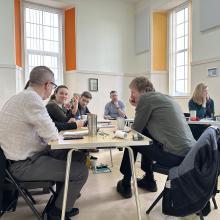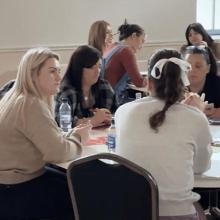The photograph shows a collection of answers to the question:
How do you feel about paperwork?
The workshop participants answered with: ‘the fear’, ‘stress', ‘repeated’, ‘crap’,‘repetitive’, ‘soul destroying’, ‘hate’, ‘don’t have much time’, ‘stressful, a lot’, and three times, ‘time consuming’.
Across the social work and social care sector, paperwork, the recording of the things done everyday, takes up a substantial part of daily tasks.
And, it feels like it.
Across our projects at Iriss, we’ve heard that paperwork is time consuming; that it’s stressful; that it feels like just another thing to do and that gets in the way of the job you are ‘meant to be doing.’
This feeling isn’t specific to one team, or about one particular form. Instead, the frustration with paperwork seems to resonate across the sector; with people in different organisations; with people who have different roles and responsibilities. At the moment, having a negative relationship with paperwork seems to be something of a universal experience.
However, for something that can have negative connotations; we can also see the value in documentation. In this sector especially, paperwork can be more than just a formality, or tick box exercise. In this sector, it can be a record of how a supported person spent their day. It can be evidence of the good care the workforce is providing. It can map the patterns needed to tailor care to someones’ needs. It supports social workers to evaluate their interventions and plan for the future. Done right, paperwork can have meaning to the workforce, and to supported people.
The workforce know this, and appreciate the role that documentation can have in their practise. But when paperwork is complex and onerous; then placed into an already busy working day, it can become a challenge to complete. This is when it feels disconnected from the people being supported. In just some of our recent projects, we’ve heard about the challenges of completing paperwork, alongside day to day tasks. Care home staff shared the volume of work they have to undertake in one day; from ensuring residents receive personal care, to having a cup of tea with someone who needs a listening ear. All of these tasks are carried out, alongside the completion of associated forms - and it’s difficult.
Similarly, Setting the Bar highlights not only that social workers are managing high caseloads, in a context of squeezed resources; but that they are doing so alongside the “growing volume and somewhat bureaucratic nature of paperwork associated with each case…" (Miller and Barrie, 2022). In Setting the Bar, 78% of respondents shared that the least satisfying part of their work was a high administrative workload; compared with 79% saying the best thing about their work was making a difference to people’s lives (Miller and Barrie, 2022).
This was mirrored in our session with social work practitioners in North Ayrshire; who identified that a typical day was dominated by desk based activities, including emails, planning, case notes, phone calls, and more. At the same time, an ideal day was described as one where social workers could build relationships with the people they support. As one practitioner shared:
“The most valuable time in the day is the time you spend with people.”
Workshop Participant
Social workers, they told us, want to connect with the people they support; but often feel like demands of the system get in the way. The tension between paperwork, and the work of supporting people, is something we have heard in other Iriss projects. It's perfectly summarised by a participant in our Covid Stories project:
We have learned that people are what actually matters at the end of the day. Paperwork is important, I agree, however this should not be given more recognition or made more important than the delivery of care. The compassion, the way care is delivered and the special relationships that staff develop with the people they care for all need to come first.
Theresa
We know that having a difficult relationship with paperwork is not new to the workforce. However, our project work is key in giving us the perspective to understand challenges for specific teams in wider contexts, and allows us to spot trends. So, if you are reading this, feeling like paperwork is getting in the way of doing your best work, and wondering how to change this; know that you are not on your own.
Changing paperwork alone cannot change the relationship that we have to it; but there is reason to be hopeful...
After a six month project working in Aberdeenshire, exploring how we can improve paperwork and note-taking, we are now at the stage where we are sending off our brand new tools to be used in practice. This piece of work has not just been about paperwork, but about the culture that surrounds it. It revolves around relationship-based, coaching-style sessions that complement practitioner’s work and existing support structures. The tool, which we co-created with senior practitioners, is supporting transformation in their paperwork and professional writing. For more information about our work with Aberdeenshire have a read of Josie's blog post.
If you are interested in designing a similar test of change in your team, we also love to support this kind of work and are always open to hearing your ideas and sharing with you how we could work with you to bring your ideas to life! Get in touch anytime.




